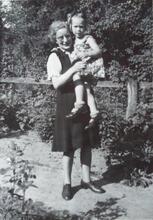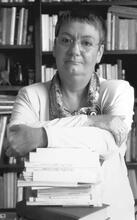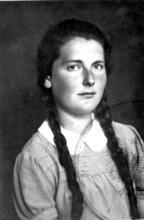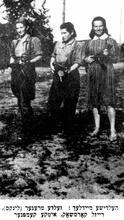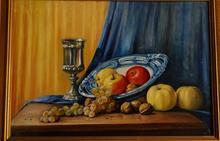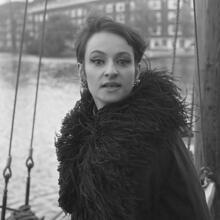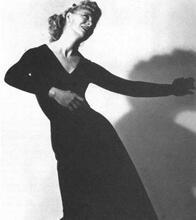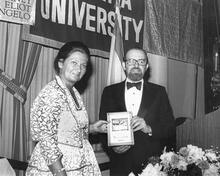Geneviève Janssen-Pevtschin
Geneviève Janssen-Pevtschin was born in Brussels in 1915 and had a liberal Jewish childhood. After completing her law degree, she practiced law until she was no longer able to due to German ordinances. She joined Service Zéro, an underground resistance movement, where she worked until she was arrested by the Gestapo in 1943. She was imprisoned until 1945; shortly thereafter, she resumed her legal work upon her return to Brussels. Janssen-Petvschin practiced law until she was appointed Belgium’s first woman magistrate. She also became a human rights activist and was a member of Youth Aliyah. She was honored as an Officer of Belgium’s Order of the Crown and is remembered for her dedication, passion, and respect for human liberty.
In April 1946, Geneviève Janssen-Pevtschin was made an Officer of Belgium’s Order of the Crown, awarded a Croix de Guerre (military cross) with palms, and promoted to the rank of captain ARA (Agent de Renseignement et d’Action). These honors were bestowed on her for the part she played in the activities of the Belgian resistance movement, the Service Zéro, during World War II. Two years later, in November 1948, she was again in the news, this time due to her appointment as the country’s first woman magistrate.
Early Life and Education
Geneviève Pevtschin was born in Brussels on February 24, 1915. Her paternal grandfather had left pogrom-ridden Russia in 1890 and moved to Belgium, while the other members of his family emigrated to the United States. His son, Geneviève’s father, already a Belgian citizen, fought in World War I. Geneviève’s mother, Gabrielle Melese, born in Belgium in 1895, was the daughter of a father from Lorraine and an Alsatian mother, whose ancestors had been French citizens since 1791.
The Pevtschins led a very liberal Jewish life, observing little other than the High Holy Days and A seven-day festival to commemorate the Exodus from Egypt (eight days outside Israel) beginning on the 15th day of the Hebrew month of Nissan. Also called the "Festival of Mazzot"; the "Festival of Spring"; Pesah.Passover and providing their children with only a minimal Jewish education. Though Geneviève Pevtschin was “confirmed” at the Great Synagogue in Brussels and occasionally attended services with her mother, she described herself as a confirmed atheist. Anti-Semitism, like all forms of racism, was anathema to her.
After completing high school at the Lycée de Saint-Gilles, Geneviève Pevtschin received her doctorate in law in 1937 at the ULB (Université Libre de Bruxelles) and also a diploma in Art and Archaeology. Soon afterwards she was admitted to the city’s bar association. She rapidly established her first, pleasant contacts with the right-wing Catholics (who constituted a majority of the association’s membership). When her career was interrupted by the German ordinances of October 28, 1940, she encountered anti-Jewish feeling among some of her colleagues but at the time she was unaware that a protest against the anti-Jewish ordinances had been sent by Louis Braffort, the president of the Bar, to General von Falkenhausen.
Acts of Resistance
Once it was no longer possible for her to practice at the bar, Geneviève Pevtschin let it be known that she wanted “to do something” by way of resisting the Germans and was put in touch with Mathieu de Jonghe, a polio victim who was always ready to take risks and who was killed at Mauthausen in July 1944. A fervent Catholic, he tried hard to persuade her to convert. The pseudonym Geneviève Pevtschin chose was Anne, a name she later gave her daughter.
In the underground Service Zéro, which had some three thousand agents, Pevtschin’s tasks included transmitting messages to London, providing false identity papers, organizing the transfer of “burnt” agents to England, and establishing contacts with other Resistance networks in order to provide them with useful information for carrying out sabotage operations. She also helped to put out “Lola,” the Belgian newspaper La Libre Belgique (Free Belgium), which appeared in thirty thousand copies. Here her tasks included taking tons of paper obtained from a financial paper, L’Echo de la Bourse, printing blocks and texts to the press, constantly risking arrest. In 1941 she was introduced to William Ugeux, director-general of Information and Action of State Security, together with Jacques Ansiaux, brother of the future senator and head of the Bar, Pierre Ansiaux.
Imprisonment
In 1943 the Resistance decided to assassinate Paul Collin, editor-in-chief of Cassandre and the Nouveau Journal. Collin was a notorious collaborator who had denounced numerous partisans. In the course of the operation, one of the members of Zéro, bribed by the Germans, turned traitor, naming Geneviève Pevtschin and others. Arrested by the Gestapo on May 21, 1943, and taken to a military prison, where she was threatened with torture, she responded only briefly, without giving any information. At the end of the day she was transferred to the prison at Saint Gilles. Tried on August 11, 1943, she was sentenced to six years of hard labor for her activities in La Libre Belgique and for her role in the Collin assassination. On the day of her trial, as she was led manacled through the Palais de Justice, lawyers who knew her showed signs of sympathy. Two months later, when she was deported, she noticed members of her family at a distance, with whom she exchanged final looks before what was to prove a long separation.
She was imprisoned in Aachen (Germany) for one week before being taken to the fortress at Anrath. Miraculously—as she put it—nobody ever mentioned that she was Jewish. However, throughout her long imprisonment she never felt any anxiety about her parents because she was unaware of the deportation of Belgian Jews. In describing this period Geneviève Pevtschin dealt less with the prison conditions than with the solidarity and courage of her unfortunate comrades. “Every day we learned who was to be shot. We shouted to encourage those who were leaving for the place of execution.” One day she received a precious present of a pair of ski boots, which saved her much suffering during the death march on which she was later sent. She was put to work sewing uniforms and in May 1944 she became part of a field group doing agricultural work, delighting in the fresh air and the hearty meals that they were served. On June 6, when the Gestapo left, she was deported across Germany to Silesia. Imprisoned, subjected to painful punishment, she was finally incarcerated in the Hauersau fortress. Imprisoned in a humid barn, laboring alternatively at sewing and munitions, she rebelled, was punished and put on half-rations. “It was hell,” she wrote, describing how the older persons died while younger ones, like herself, managed to survive. On January 20, 1945, with the Russians approaching, the evacuation death march began, in bitterly cold weather. The prisoners sometimes went for thirty-six hours without food, covering a total of one hundred and seventy-five kilometers.
Towards the end of the march Geneviève Pevtschin was again imprisoned, first at Gaerlitz, then in Saxony, where she arrived on February 12. There she was put on a train bound for Czechoslovakia. At one point she was so hungry that she ate a dead pigeon that she found. The train was bombed some thirty kilometers south of Dachau. The survivors were again imprisoned for three weeks. Despite an outbreak of typhus they maintained their morale, learning English, singing, telling stories, and exchanging recipes. In mid-March they were released from their cells in order to be put to work once again. On April 20 Allied tanks passed through the village but failed to notice the prisoners. They next day they were at last liberated.
Traveling across a devastated Germany, Geneviève Pevtschin arrived at the Belgian border only to be refused entry for health reasons. At a frontier post she found some Belgian journalists through whom she conveyed messages for help. Finally, on May 2, she reached Brussels, with a weakened heart and thyroid problems. Nevertheless, she invested all her strength in ensuring the repatriation of her fellow prisoners. She also resumed her legal activity, working with her uncle, Maurice Krieg.
Legal and Judicial Career
In 1946, as the first woman in the history of the Law Courts to serve as keynote speaker at the Conférence du Jeune Barreau de Bruxelles (Organization of Young Lawyers), she chose as her topic “Pierre Brachet and the Defence of Liberty,” eulogizing a young lawyer who had been killed at the front in Madrid in 1936 and who, as she put it, realized that when the bell tolled for the end of freedom in Spain it also tolled for that in Belgium. “In the profound silence of a deeply moved audience, she achieved greatness,” a colleague reported in the Journal des Tribunaux (Law Journal).
Geneviève Pevtschin practiced at the bar until her nomination as magistrate in November 1948, following the passage of a law in February of that year which permitted the appointment of women. While mainly welcomed by her superiors, she was made to work hard, sitting in session six days a week and also at special sessions in alternate weeks.
In 1949 she married the lawyer Marcel Janssen, who had also been a political prisoner during World War II. Marcel Janssen was elected president of the Order of Lawyers in 1967, three months before he died. The couple had a daughter, Anne, who also became a lawyer. Born in 1950, Anne died in 1981, leaving two daughters aged four and two, respectively.
Geneviève Janssen-Pevtschin continued her career for thirty-seven years, dealing primarily with civil cases and especially those relating to intellectual rights at the Brussels Appeal Court, to which she was appointed in 1973. She also sat on the Court of Assizes. In February 1985, when she reached the age of seventy, she opted to continue working for as long as possible, until November of that year.
Human Rights Activism
While serving in the Brussels law courts, Geneviève Janssen-Pevtschin also put her legal expertise at the disposal of the European Commission on Human Rights, to which she was appointed at its first Belgian member in 1954. She was at first one of only three women on the Commission, but soon remained the only one until 1972. She was active in Belgium’s linguistic dispute between French and Flemish-speakers, the Greek-British dispute over Cyprus, and issues relating to the rights of German homosexuals, who claimed they were discriminated against more than were lesbians.
In 1972 she became Belgium’s expert at the European Council in Strasbourg and was instrumental in the establishment of the new Court for Human Rights which began its work in November 1998. She was a member of the editorial boards of both the Journal des Tribunaux and the Trimestrial Review of Human Rights, also participating in all the meetings of the latter’s academic committee. During the last twenty-five years of her life she was a member of the Pensions Appeals Committee for political prisoners and prisoners of war. She also became a member of Youth Lit. "ascent." A "calling up" to the Torah during its reading in the synagogue.Aliyah, of which her husband was vice president, and served on the Commission for the Reform of Marital Rights and Obligations and Marriage Contracts.
Despite her impressive curriculum vitae, Geneviève Janssen-Pevtschin liked to stress her membership in the Charles Janssen school library, founded in the 1920s on the model of the American “happy hour,” and especially her membership in the committee of the Brussels Municipal Kindergarten Number 5.
Legacy
Geneviève Janssen-Pevtschin died on November 11, 2001. Even before the official annual eulogies for deceased members of the Bar, its Brussels members paid homage to her, referring inter alia to the courage with which she had defended her Jewishness. André Rostenne, her colleague in the resistance movement, recalled her dedication to her country, the price she paid for her loyalty, and the fact that she never wished to have it referred to. The president of the Bar Association, who later eulogized her, spoke of the passion with which she practiced her profession, her respect for human liberty, humanity, and dignity. He spoke of her wartime travails, the humor which enabled her to survive, and the exceptional intelligence which distinguished her.
As far as her colleagues were concerned, he maintained, “She would always remain an exceptionally honored advocate, the sparkling wife of the late Marcel Janssen, dazzling president of the Union of Young Lawyers, attentive mother to our young people and sad colleague of Anne Janssen, her only daughter, who died prematurely. … Geneviève Janssen-Pevtschin shared with the members of the bar her joys, her promise, her sorrows, always dignified, honest, welcoming, passionate about law. She fought to the end, until June 23, in order to be present at the wedding of her granddaughter Florence. Our entire Court of Law is filled with sorrow.”
Gubin, Elaine, ed. “Pevtschin Geneviève.” Dictionnaire des femmes belges: XIXe et XXe siècles. Belgium: Lannoo Uitgeverig, 2006.
Schandevyl, Eva. “Women and the Courts in Twentieth-Century Belgium: An Historical Perspective.” New Perspectives on European Women’s Legal History. Kimble, Sara L. New York: Routledge, 2016.
Wiener-Henrion, Jacqueline. “Geneviève Janssen-Pevtschin.” Les Cahiers de la Mémoire Contemporaine (2002).

